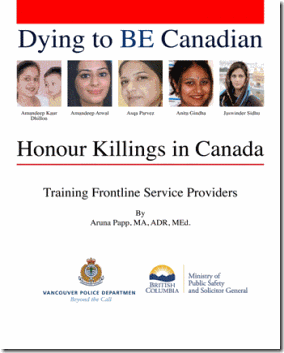On the Shafia Case…
Hey yo.
I don’t want to spent a lot of time on this matter, but I was stirred to comment (however briefly) about the Shafia murder trial.
I presume your basic knowledge of the case, as most mainstream media outlets spent a considerable time with it. It was, after all, a most horrific crime. Today, the verdict was handed down to the father, brother, and mother – all guilty, and all facing life in prison.
Before going on, I would like to reiterate the heinousness of the crime here. I have no intention of arguing for the convicted members of the Shafia family, making excuses for them, or pardoning them of the crimes they have been accused, charged, and convicted of.
This piece was inspired purely by the discussion that the verdict has generated. Specifically, the expression of outrage at ‘honour killings’ (the going term) and the lament for Canadian multiculturalism and how it has gone too far. I would like to suggest that, actually, by dubbing this an honour killing, we satisfy an elementary understanding of the crime while sidestepping the larger point.
The point, of course, is that this was a crime about control. Shafia was obviously exercising a level of control over the victims, and asserting his male dominance by robbing them of their agency. The violent act was Shafia’s response based on his belief that he has agency over these women, and they ought to act according to his worldview, a worldview many attribute to his ethnic background.
I have no intention of condoning this particular worldview. Y’all use words like “backwards”, “uncivilized”, and I’m not sure if those words are the precise words, but I’ll take your words and instead sub in “unacceptable”. I think that’s fairly agreeable? You can add an F word for good measure.
Where we go wrong in the discussion is here: we take Shafia’s robbing of women’s agency (with its cultural justification) and we call it an ‘honour killing’.
Instead, I suggest we drop the specific-language act and instead, we call it what it is: an exercise of controlling women. A deplorable practice of abuse of women, one that depends on deeming women not worthy of making decisions about their own bodies.
The reason I suggest we abandon using exceptional language is this: the same underlying assumption, the assumption that women ought to not make decisions about their own bodies, that women are not deserving of agency over their own destinies is used every single day in “our culture”, whatever you take that to mean (In this particular piece, I am taking that to mean some dominant culture, and not diving too deep into this).
Every time a woman is raped, a policy is passed about women’s bodies without taking agency into account, or a domestic abuse is committed, it is stemming from that exact belief. It gets a bit tiresome making the parallel everytime: Yes, a man who commits an “honour killing” is using his cultural baggage to justify his horrible act. But you know what? So is a man who rapes a woman because he thinks women’s bodies do not belong to them.
The mistake, in my opinion, made in discussing the Shafia case is assuming that cultural baggage only affects a certain segment of the population. Worse, there also seems to be an assumption that rape is a bunch of singular incidents and not culturally learned. Same thing as domestic abuse. We barely connect these crimes to a cultural learning that is pervasive throughout our culture, and that learning is the same one Shafia, his son and his wife were guilty of: the learning that women’s bodies must be controlled, and that women should possess less agency over their bodies.
So, to sum it up: Yes, the murder of these women was a heinous crime. Yes, it is a result of cultural understanding of how much agency women should have over their own bodies. But we need to ask ourselves, how many other crimes are we not attributing to the same cultural understanding? Stop calling it honour killing, and start calling it an exercise of stripping women of power. Then look for other examples of it, and you’ll find them all around you.
I have no intention of “relegating or implicitly excusing the role of culture” in this crime, as some folks have commented to me. On the contrary, I’m asking you to consider the role of culture in all violence against women.
As a final word, I guess, one of the hardest lessons I’ve learned is to question where my gut response is comin
g from. I’m not assuming yours is invalid. I am, however asking you to consider the possibility that it might be coming from a place of not spending time questioning where your own ideas may be coming from.
Oh, hey, if you have a comment back, tweet me: @elamin88.
_______________________________________
Editor’s Note:
At Battered Women’s Support Services, we have spoken about the need for a deeper analysis and understanding of violence against women and the role of culture. Our training programs, our speaks and our written materials always present an understanding that violence against women is an issue across and within all cultures, communities, nation states and is profoundly embedded in what we would understand as mainstream Canadian culture. The continuation of highlighting the specific manifestations violence against women within specific “cultures” through over representing specific “cultures” as some how more violent presumably than Canadian “culture” is a misrepresentation of the culture of violence against women that all the women who access Battered Women’s Support Services know all too well. The following Spiral of Gender Violence illustrates how violence follows girls and women through the life cycles.
UPDATE* In 2010, Gerald Caplan wrote the following for the Globe and Mail:
“But terrible things still happen to women everywhere, as the domestic violence figures for Canada demonstrate. No nation, religion, class or ethnic group has the monopoly on misogyny. Honour killings should be seen not as uniquely evil but as the most extreme and perverse proof of this truth. That’s why it’s encouraging that women’s equality groups have been so vocal in their denunciations of all violence against women and are supporting women in minority communities to give them the strength to stand up for their rights.
Despite the remarkable progress women have truly made in the past half-century, clawing for every inch of it, the struggle for women’s equality can never rest. It simply has too many enemies, always fighting to keep women in their place, where they belong, dead or alive. Young women who dismiss feminism as irrelevant or outdated are, I’m afraid, dead wrong. The struggle is never over.”
UPDATE *
Yasmin Jiwani offered the following in the Montreal Gazette:
“Calling the murders “honour killings” accomplishes two goals. First, it makes it seem as if femicide is a highly unusual event. Second, it makes it seem as if femicide is confined to specific populations within Canada and specific national cultures or religions in the world at large. But Canadian statistics prove otherwise. According to StatsCan figures, from 2000 to 2009 an average of 58 women a year were killed in this country as a result of spousal violence. In that same period, 67 children and young people aged 12 to 17 were murdered by family members. In contrast, recent estimates tell us that there have been 12 or 13 so-called honour killings in Canada in the last decade. It does not take a genius to see that comparing 12 or 13 against the hundreds of women and children who were victims of familial violence serves only to frame “honour killing” as peculiar, when in reality it is part of a larger pattern of violence against women.”
Read more: http://www.montrealgazette.com/news/Should+call+honour+killing/6074266/story.html#ixzz1l4jYw7Y6
The Lifetime Spiral is designed by Asian & Pacific Islander Institute on Domestic Violence (2007)
We recognize that it is of critical importance to identify the historic, legal, attitudinal and behavioural discrimination women experience that is embedded in mainstream Canadian culture and within Immigrant communities. The message continues to be a difficult one for Canadian society to manage as illustrated in the following media reports and in the promotional materials for an upcoming training for service providers co-sponsored by Vancouver Police Department and BC Ministry of Public Safety and Solicitor General.
http://www.vancouversun.com/Shafia+jury+finds+guilty+shameful+honour+killings/6071601/story.html
http://fullcomment.nationalpost.com/2012/01/30/mohammad-shafia-was-so-obsessed-so-closed-minded/







